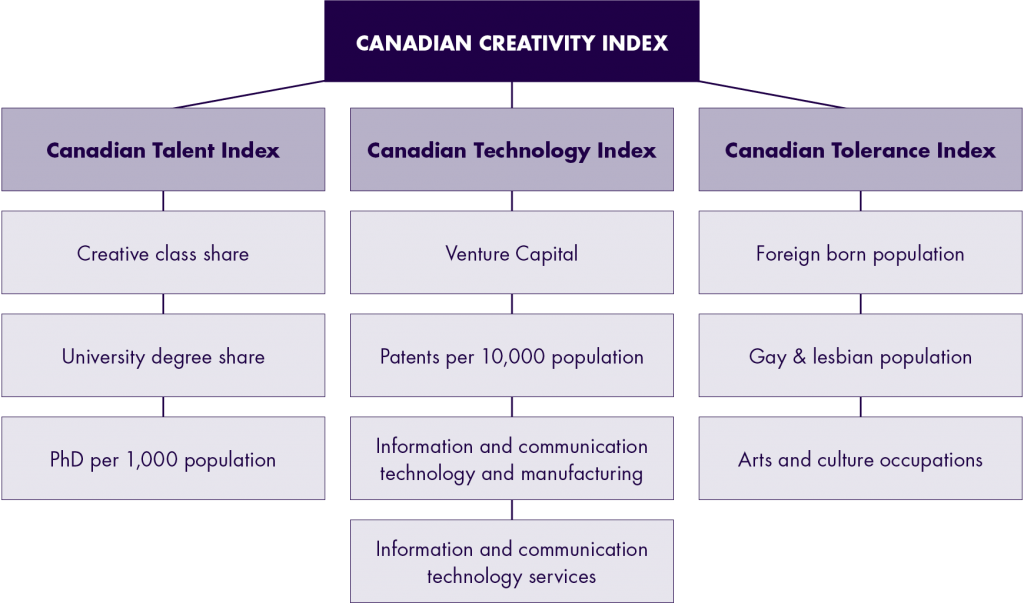Canada sits at an economic crossroads. Historically, the national economy was largely defined by its ability to extract and export natural resources. The country’s recent slide into recession, thanks to lagging world oil prices, is a stark reminder that busts accompany the booms associated with the nation’s dependence on natural endowments. Yet, for the past decade or so, Canada’s leadership has created a narrative that its resource-rich west is the primary source of long-run prosperity for the country.
The real source of sustained prosperity and rising living standards in today’s economy turns on knowledge, innovation, and creativity. Canada has neglected the development its knowledge-based economy. This is a step backward and an unfortunate mistake.
The upshot is that Canada is made up of two distinct economic models with two distinct geographies. Resources drive the West, while knowledge and creativity, concentrated in the nation’s largest city-regions, propel development in the East.
But embracing one economic model doesn’t mean abandoning the other. Rather, we need to shift the emphasis from the energy economy to the urban knowledge economy.
These are some of the key findings of Canada’s Urban Competitiveness Agenda: Completing the Transition from a Resource to a Knowledge Economy, a new Martin Prosperity Institute study by Richard Florida and Greg Spencer. The report provides a data-driven examination of Canada’s two growth models. It identifies knowledge-based metros in terms of the 3Ts of economic developments: talent, technology, and tolerance (see the chart below). It compares their performance to that of Canada’s natural resource economies.
Components of the Canadian Creativity Index
Toronto comes out on top on the overall Creativity Index, followed by Ottawa-Gatineau, Vancouver, Montréal, and Kitchener-Waterloo. The top performers all have leading major research universities and are national or provincial capital cities.
Ottawa-Gatineau ranks first on the Canadian Talent Index, which gauges the ability to produce, attract, and retain talent, followed by Guelph and Kingston.
Kitchener-Waterloo, Toronto, and Ottawa-Gatineau takes the top spot on the Canadian Technology Index, our measure of innovation, venture capital, and high-tech industry.
And Toronto, Vancouver, and Montréal lead the Canadian Tolerance Index, which measures how open and tolerant places are to immigrants and people who are gay, among others.
In most cases, small communities whose economies are based on resource extraction fall into the three indices’ bottom rungs.
Top Ten City-Regions on the Canadian Creativity Index
| Rank | City | Province | Canadian Talent Index | Canadian Technology Index | Canadian Tolerance Index | Canadian Creativity Index |
|---|---|---|---|---|---|---|
| 1 | Toronto | ON | 80.9 | 84.7 | 97.4 | 87.6 |
| 2 | Ottawa-Gatineau | ON/QC | 100.0 | 82.6 | 77.4 | 86.7 |
| 3 | Vancouver | BC | 79.6 | 77.4 | 100.0 | 85.7 |
| 4 | Montréal | QC | 73.5 | 82.2 | 87.1 | 80.9 |
| 5 | Kitchener-Waterloo | ON | 69.2 | 100.0 | 55.2 | 74.8 |
| 6 | Victoria | BC | 85.6 | 43.8 | 80.7 | 70.0 |
| 7 | Calgary | AB | 79.2 | 57.4 | 65.4 | 67.3 |
| 8 | Guelph | ON | 93.0 | 33.1 | 56.8 | 61.0 |
| 9 | Halifax | NS | 78.6 | 33.2 | 64.7 | 58.8 |
| 10 | Québec City | QC | 80.9 | 84.7 | 97.4 | 57.4 |
Canada is one of the few nations in the world that has combined these two pillars of resource-based and knowledge-driven economic growth. Calgary, one of Canada’s fastest growing cities over the past decade with among the highest incomes in the country, provides an interesting and useful example of what can happen when the two models are combined. It is a leading center of the oil and gas economy while the creative class makes up nearly 40 percent of its workforce, fourth in the nation, just ahead of Toronto.
All Canadians want to see their cities and their nation grow and their living standards rise. It’s time to abandon the narrative that future prosperity lies in the wide-open, naturally abundant frontiers of the West and understand that the key to the nation’s future economic well-being lies in the human-built resource of its cities. That means using the resources from the energy economy to build a more secure future as an urban knowledge economy, while simultaneously using technology and knowledge to deepen and expand the resource economy. The economic future of all Canadians, no matter where they live, rests on an increasingly urban knowledge economy organized around and propelled by our cities.
Download this Insight. (PDF)
Look up any Canadian city’s 3T key indicators here. (Excel file)
